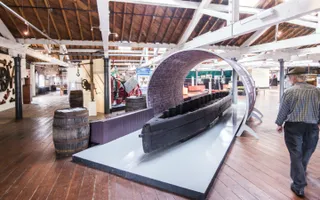I'm the collections manager for the Canal & River Trust's museums. My team and I look after 15,000 objects and 76 national historic ships across our museums at Gloucester, Ellesmere Port, Stoke Bruerne and at our other attractions around the country.
Meet Becky


Historic vessels don’t behave. They have their own personalities and they’re going to do the thing you didn’t plan for!

The biggest item we look after is the 95-year-old steam dredger (pictured) in Gloucester. The smallest is probably an Acme Thunderer Whistle from here at Ellesmere, which might have been used for emergencies on the port or at the fire station.
Specialist knowledge
My team has a lot of knowledge, built up over the years, about caring for our collections. We work with boat-builders, and we have conservators who advise us on the best chemicals to use so that we don't damage anything.

Naval architects help us to build cradles for boats when they're on land. We also work closely with the National Historic Ships Register, and we head the Inland Waterways Heritage Network, which brings together groups of passionate people who look after historic inland waterways vessels.
I'm a trained archaeologist, but before I did this job I was running an engineering project on a heritage railway, building a 150-tonne steam locomotive. My specialism is in working collections − basically anything that is historical, that needs to be kept in working order and still doing the same job it did 50 or 150 years ago.
Coping with lockdown
What's different now, during the coronavirus outbreak, is that I can't visit our other museums and stores, so I'm having to do a lot of remote management. I'm liaising with the teams in each area, asking them to go and visually inspect the boats and collections. There's a lot of video-calling to advise about what to look out for. Historic objects and vessels don't behave. They have their own personalities and they're going to do the thing you didn't plan for!
One of our historic narrowboats, Shad, was inspected at the start of March and we discovered that the bottom of the boat was deteriorating. We had plans to put it into dry-dock for repairs, which have had to be put on hold. The problem is that timbers continue to rot, even when the country is on lockdown. So we're now having to manage the boat in a scenario that we hadn't planned for.
Pulling together
We've also been losing water out of our lower basin at Ellesmere Port and this has affected four historic vessels. The biggest problem is that where there is reduced movement of boats on the canal at the moment, we don't get the water flow we usually do, and that's had a subsequent impact on levels further down in the basin. We've been working closely with the North West regional team to fix the issue.
The South West and Wales operations team, who usually look after the managing of the canals, are now having to do the official inspections of our historic vessels at Gloucester. It's a little bit different from what they're used to.
The one positive from the lockdown has been that lots of different Trust departments are pulling together. The regional teams, the operational teams, the engineering department, ourselves – we've all had to work together to find solutions, because we can't get equipment on site or staff in large numbers to fix the problem. It's definitely taken a bit of brain power!


Stay connected
Sign up to our newsletter and discover how we protect canals and help nature thrive




